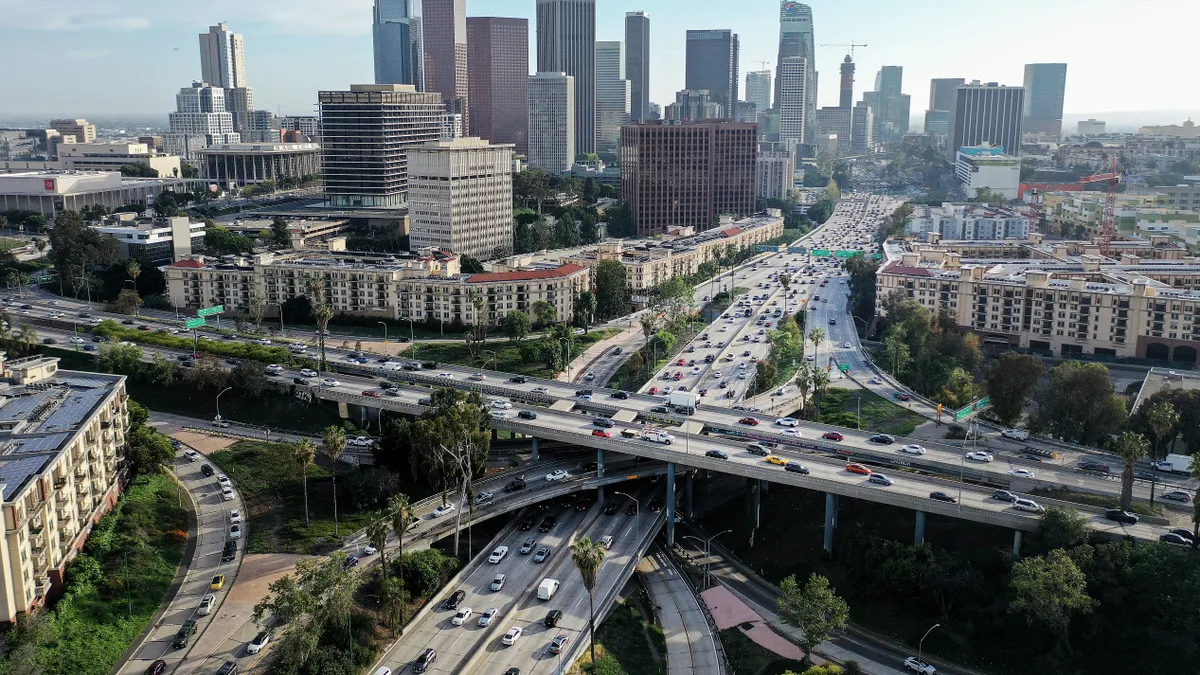Dive Brief:
- Los Angeles’ climate action plan from 2019 “has largely outlived its usefulness” and urgently needs a reboot, the city controller’s office said in a report published this month. The report says the city’s plan has a lack of specific, measurable targets and focuses on the tasks completed by the city rather than the impact of those policies, studies and pilots.
- The climate action plans of most major cities show a similar lack of meaningful metrics, the report says. The city controller’s office concluded after reviewing the plans of San Francisco, Denver, Seattle, Boston and New York City that none were significantly better than Los Angeles’ plan, but they do offer “valuable insights to help guide the needed reboot.”
- The report outlines how Los Angeles should approach a reboot and offers improved metrics to measure climate progress. Suggested metrics include real-time data on energy sources for the city’s water and power department, number of childhood asthma-related hospital visits, and amount of stormwater captured and not captured.
Dive Insight:
When Los Angeles first unveiled its “Green New Deal” climate action plan four years ago, it was a “pioneering embrace of a local version of a national Green New Deal,” the city controller’s office report says. But “the mixed results in the following four years contain vital clues about how we must improve our response,” it adds.
The report criticizes the city’s last progress report, published in May 2022, for mostly inventorying short-term milestones designed to meet the city’s 47 ambitious long-term sustainability goals, rather than focusing on progress to the long-term goals themselves.
“The emphasis on short-term milestones may have been a way to jump start policy and programmatic initiatives,” the report says. “Yet simply achieving a milestone doesn’t necessarily translate into meaningful progress toward the targets.”
Almost half of the plan’s 97 short-term milestones have been achieved or exceeded, but just nine of the remaining unmet milestones were “on track” to meet future goals for 2025 and beyond, the report by the city controller’s office says. “Of those nine, five are too general to meaningfully evaluate (such as ‘improve access to community programs in low-income areas’),” the report says. It has similar criticisms of goals such as “deploy additional charging stations by 2021” and “create 100,000 green jobs by 2025,” asking what undefined terms such as “additional” and “green jobs” mean.
The report comes on the heels of Mayor Karen Bass’ announcement last month of a list of the city’s recent climate achievements. The city controller report says these efforts clearly represent progress but were also not benchmarked against measurable goals.
The city controller’s office suggested that the city show climate progress with hard data, rather than vague scores such as “on track” and “making progress.” It said that a constantly monitored dashboard is needed to mark progress against actionable targets.
The report highlights meaningful metrics from other cities’ climate action plans, such as San Francisco’s 2023 goal to expand publicly accessible EV charging to 10% of spaces in municipally owned parking lots and New York City's goal to install 1 million square feet of cool roofs annually.
Despite calling for a reboot of the city’s climate action plan, the city controller’s office is adamant that more documents and plans, rather than action, can divert energy and delay action.
A reboot “does not mean going back to square one to prepare a new document,” the report says. “It means learning from the successes and shortcomings of the last four years of ‘Green New Deal’ implementation in order to successfully execute a U-Turn on the highway to climate hell.”












